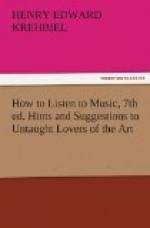Thus Trench, and his historical definition, explains why in music also there is something more than a lurking suggestion of excellence in the conception of “classical;” but that fact does not put away the quarrel which we feel exists between Classic and Romantic.
[Sidenote: Romantic in literature.]
[Sidenote: Schumann and Jean Paul.]
[Sidenote: Weber’s operas.]
[Sidenote: Mendelssohn.]
As applied to literature Romantic was an adjective affected by certain poets, first in Germany, then in France, who wished to introduce a style of thought and expression different from that of those who followed old models. Intrinsically, of course, the term does not imply any such opposition but only bears witness to the source from which the poets drew their inspiration. This was the imaginative literature of the Middle Ages, the fantastical stories of chivalry and knighthood written in the Romance, or Romanic languages, such as Italian, Spanish, and Provencal. The principal elements of these stories were the marvellous and the supernatural. The composers whose names first spring into our minds when we think of the Romantic School are men like Mendelssohn and Schumann, who drew much of their inspiration from the young writers of their time who were making war on stilted rhetoric and conventionalism of phrase. Schumann touches hands with the Romantic poets in their strivings in two directions. His artistic conduct, especially in his early years, is inexplicable if Jean Paul be omitted from the equation. His music rebels against the formalism which had held despotic sway over the art, and also seeks to disclose the beauty which lies buried in the world of mystery in and around us, and give expression to the multitude of emotions to which unyielding formalism had refused adequate utterance. This, I think, is the chief element of Romanticism. Another has more of an external nature and genesis, and this we find in the works of such composers as Von Weber, who is Romantic chiefly in his operas, because of the supernaturalism and chivalry in their stories, and Mendelssohn, who, while distinctly Romantic in many of his strivings, was yet so great a master of form, and so attached to it, that the Romantic side of him was not fully developed.
[Sidenote: A definition of “Classical” in music.]
[Sidenote: The creative and conservative principles.]
[Sidenote: Musical laws of necessity progressive.]
[Sidenote: Bach and Romanticism.]
[Sidenote: Creation and conservation.]




